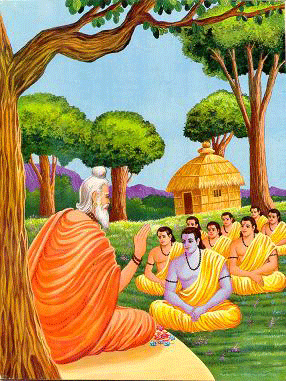
03 Mar Indian Philosophy 101
A friend of mine recently asked me, “According to Indian philosophy, what is the meaning of life?” While this being a very fair question to ask, I stumbled more than a few times in my response. After thoughtful consideration, I was able to distill it down to the following:
It has been said that the great Rishis of India meditated over the fundamental questions of existence: i.e., Who is the creator? What is life? What is ‘truth’? What is ‘the nature of reality’? What was revealed to them was expressed in hymns. As time progressed, the collection of these hymns came to make up the Vedas and the Upanishads.
Indian philosophy uniquely describes four basic concepts of ethics (purusharthas) of human life. They are: artha, kama, dharma and moksha. Let’ s take a closer look at each of these:
(1) Artha: The Sanskrit word artha means ‘that which one seeks.’ Whatever activity and physical material a man needs to support life can be considered artha. Artha has to do with providing for the hunger, thirst, safety needs that are inherent in living in a physical body. In our modern world, this generally means having money to provide for the essentials.
(2) Kama: Humans seeks pleasure in various activities and material objects. Pursuit of happiness and pleasure is a basic, natural instinct of human beings. Humans derive pleasure from relationships and material objects like food, drink, etc. This is called kama. Desires must be acknowledged and reasonably fulfilled with mindfulness so as to move towards freedom from them, not adding to a continuous cycle of fulfilling and intensifying.
(3) Dharma: The word dharma comes from the Sanskrit root ‘dhr’ meaning ‘to sustain’ or ‘to support’. Dharma sustains or maintains life. Dharma supports society. Man lives in society, with fellow-men and various life forms. Dharma lays down duties and obligations expected of man. To live in dharma is to live with our individual nature to be in accord with the whole of the flow of things. Dharma has also been called: natural law, harmony, truth, duty, wisdom, and the inherent nature of things.
(4) Moksha: Moksha means liberation or total freedom. The Sanskrit word moksha is derived from the root ‘muk,’ which means ‘to emancipate’ or ‘to release’ or ‘to free.’ Indian tradition considers moksha as the ultimate goal of life. The sufferings of man are due to avidya, his original ignorance about Self. He has been oblivious of his true identity. He attaches himself to worldly objects. Tempted by insurmountable desires, he remains bonded to mundane objects. When knowledge (vidya) dawns on him, he overcomes the dualities of the world and identifies himself as the infinite, eternal Being. Having been completely free from all attachments, expectations and desires, the liberated soul attains moksha. Moksha refers to liberation from the cycle of death and rebirth. Moksha is the direct experience of the Absolute Truth or Reality, along with the total setting aside of all false identities of who we think we are.
----
Support the Monkey
Every product in our articles and interviews is independently selected by (obsessive) editors. Products you buy on Amazon through our links feed the Monkey. Commissions from your Amazon purchases are crucial for us to continue to provide you with the content you love.
Supporting the Monkey costs you nothing – but it is dependent on using our Amazon links.
Click here to go directly to the AMAZON.COM Homepage


